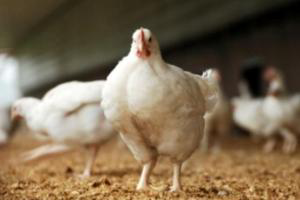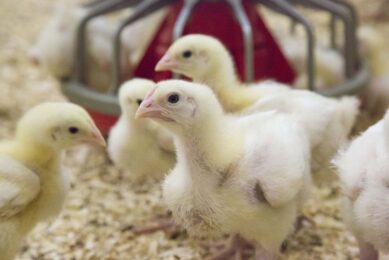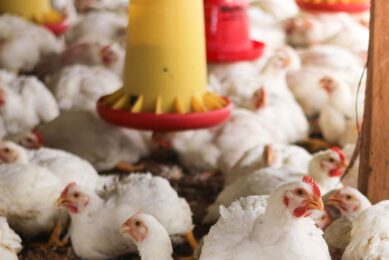Probiotic E. faecium can promote poultry growth

Researchers from the Zhejiang University in China looked at the effects of a probiotic, Enterococcus faecium, on growth performance, intestinal morphology, immune response, and cecal microflora in broiler chickens challenged with Escherichia coli K88.
The effects of feeding dehydrated Enterococcus faecium on growth performance, immune response, and cecal microflora in broiler chickens challenged with Escherichia coli K88 were investigated. Two hundred and eighty-eight one-d-old birds were randomly assigned to four treatments:
- negative control birds (N-con) fed a basal diet and not challenged with E. coli K88;
- positive control birds (P-con) fed a basal diet and challenged with E. coli K88;
- birds fed a basal diet including dehydrated E. faecium (Ef) at 1 × 10(9) cfu/kg of feed and challenged with E. coli K88;
- and birds fed a basal diet including the antibiotic colistine sulfate (Anti) at 10 mg/kg of feed and challenged with E. coli K88.
Birds fed E. faecium had greater (P < 0.05) BW on d 14, 21, and 28 and greater (P < 0.05) jejunal villus height on d 21 and 28 compared with birds on the other treatments.
Jejunal crypt depth was decreased (P < 0.05) in birds fed either E. faecium or antibiotic compared with P-con treatment birds on d 10, 21, and 28. Birds fed E. faecium had a greater (P < 0.05) concentration of IL-4 in their jejunal mucosa than did those in the N-con treatment group on d 10, 14, and 21. Infected birds, with or without E. faecium feeding, had a higher (P < 0.05) tumour necrosis factor-α and secreted IgA in their jejunal mucosa than did those in the N-con treatment group on d 10 and 14. Birds fed E. faecium had lower (P < 0.05) concentrations of E. coli on d 14 and 28, less (P < 0.05) Clostridium perfringens on d 28, greater Lactobacillus counts on d 14 and 21, and greater (P < 0.05) Bifidobacterium in their cecal contents on d 21 than did the P-con birds.
These results suggest that E. faecium can promote growth performance, improve intestinal morphology, and beneficially manipulate the cecal microflora in broilers challenged with E. coli K88.
This study was published in the November issue of Poultry Science.
Join 31,000+ subscribers
Subscribe to our newsletter to stay updated about all the need-to-know content in the poultry sector, three times a week. Beheer
Beheer








 WP Admin
WP Admin  Bewerk bericht
Bewerk bericht